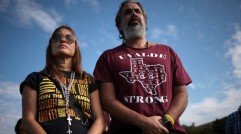Adamari López: 'Un Nuevo Dia' Host Talks Challenges for Immigrants Diagnosed With Cancer
Adamari López teamed up with biotechnology company Amgen to create a web resouce for Spanish speakers suffering from cancer. The resource is called Quimioterapia: Mitos y Realidades and is an extension of the English website, Chemotherapy: Myths or Facts, according to a company press release.
López recently said in a communication that for immigrants who don't speak English, a cancer diagnosis can be that much scarier, according to TV Notas.
"It's many of us immigrants who are diagnosed in this country and we face a doctor who only speaks English," she said. "Between the fear of facing the diagnosis you are being given, and not understanding the terms doctors are using, you become disoriented and filled with anguish."
The actress and "Un Nuevo Dia" TV host suffered from breast cancer in 2005. She was treated and is now cancer free. She has become a breast cancer advocate and through the website wants people to know what to expect during chemotherapy and answer their questions.
"When going through a difficult situation, like a cancer diagnosis, it is critical to get information in your native language. I learned this first hand during my own chemotherapy journey, when I struggled to find helpful resources in Spanish," López said in late 2014.
"Quimioterapia: Mitos y Realidades aims to bridge a gap for Spanish-speaking cancer patients by providing valuable in-language information to help them take charge of their chemotherapy journey," she added.
Almost one in two Hispanic men and one in three Hispanic women will be diagnosed with cancer in their lifetime. Having an online resource in Spanish is very useful to Hispanics. Research also shows that Hispanic adults that receive a cancer diagnosis have very specific challenges when going through treatment, and many of their decisions are based on cultural factors, such as language, beliefs, values and traditions.
Doctor Mike Cusnir, an oncologist and hematologist, is working with Amgen. He says that many people faced with going through chemotherapy have incorrect assumptions about it.
"For example, some patients believe they have to isolate themselves from friends and family during treatment, or are unaware of certain side effects that they need to be prepared for," he said.
"Quimioterapia: Mitos y Realidades provides useful resources for Spanish-speaking patients and their caregivers to help them ask the right questions, and together, make the best decisions possible with their doctor."
The web resource will provide cancer patients with educational resources and videos featuring López and Dr. Cusnir.
The English-speaking website can be reached by visiting chemomythsorfacts.com.
The Spanish-speaking website can be reached by visiting miquimioterapia.com.
Subscribe to Latin Post!
Sign up for our free newsletter for the Latest coverage!
* This is a contributed article and this content does not necessarily represent the views of latinpost.com














